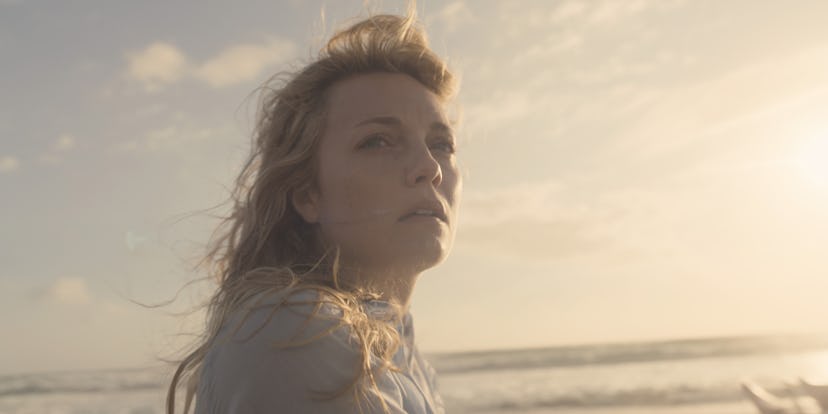Leila George Explains the Significance of the Disclaimer Finale
The Australian actress talks playing a young Cate Blanchett and the lesson behind the new series’ dark twist.

Warning: major spoilers ahead for Disclaimer
Nothing is as it seems in Disclaimer, the dark new psychological thriller series from five-time Oscar-winning Roma director Alfonso Cuarón. The dizzying refraction of reality that marks the seven-part series is clearly presented in its first “chapter,” when the protagonist, Catherine Ravenscroft (played in present-day by Cate Blanchett, who rarely works in television, and in flashbacks by fellow Aussie actress Leila George), accepts an award for her work as an investigative journalist. “Beware of narrative and form,” she tells the seated crowd. “Their power can bring us closer to the truth, but because of our own deeply held beliefs and the judgments we make, they can also be a weapon with a great power to manipulate.”
The prescient words end up being a warning to Disclaimer’s audience, too, who find by the end of the beautifully shot series that whatever assumptions they first had about its characters are woefully wrong. Adapted from the 2015 Renée Knight novel of the same name, Disclaimer’s meta-narrative finds Catherine’s life turned upside down when she and those closest to her are sent an anonymously written novel detailing events from several decades prior. She is the thinly veiled main character of the novel, who while on vacation in Europe, cheats on her husband, Robert (Sacha Baron Cohen) by way of seducing a naive young man, Jonathan (Louis Partridge), who then drowns while trying to rescue her young son. Catherine is presented for most of the series as a sociopathic narcissist driven solely by the pursuit of her own pleasure, but by the series’ final chapter, we learn she was actually Jonathan’s victim.
George was tasked with playing the younger version of Blanchett. Told in gold-tinted flashbacks, each moment of her story takes on a double meaning once the twist is revealed. The 32-year-old actress, who most recently starred in the crime-drama series Animal Kingdom, recommends watching Disclaimer twice to get the full effect. She spoke with W ahead of the finale to discuss working with Cuarón, Blanchett, and the significance of the series’ dark turn:
What drew you to this role? Had you read the book prior?
I learned one day that Alfonso Cuarón was going to call me about the project. I find those director meetings really daunting, because you’re supposed to sell yourself in some way, which I’m not good at. I thought I would get some brownie points by reading the book first, but he was very upset about that. He joked, “No, you cheated!” because he wanted me to experience the twist through the script.
And what did you think when you read the twist?
When I read a script, I’m immediately stepping into the mind-set of that character, so I didn’t find myself judging her as harshly. I found it quite shocking how everyone spoke about how evil she was. It's why I hope people keep watching through to the end, and then maybe watch again, because Alfonso so meticulously made sure that the end made sense with the beginning.
In a way, you had to play two different characters. Was that challenging?
There’s only one moment where Nancy, played by the brilliant Lesley Manville, meets Catherine [played in that scene by Cate Blanchett]. Whatever Nancy saw in that meeting—a little flick of the hair or a posture or the sound of her voice—had to stay the same, because she writes this character in the novel based on that. In the first four episodes she’s a seductress—she’s like a siren mermaid, hypnotizing the sailor, like Medusa. We talked about her feeling very confident and self-assured and how she enters a room knowing that all eyes are on her. That’s in contrast with the real Catherine, who maybe enters a room apologizing to everyone.
Leila George as Catherine and Louis Partridge as Jonathan
How did you approach playing a younger Cate Blanchett?
I got half a day to watch her block out some of the scenes I was going to do. She created this incredibly emotionally complex character, full of little mannerisms and ticks. I was able to see those and pick some of them up. We also worked with the same dialect coach, which was really useful in making sure that our sound was unified throughout the whole project. It didn’t have to be an exact replica, because we change so much as we grow and evolve.
What was working with Louis Partridge like? You had some intense scenes to film together.
Those scenes are really just choreography, like making up a dance or building a fight scene. You do one wrong or improvised move, someone could get hurt. It’s important to plan it all out. We did have an amazing intimacy coordinator, but mostly it’s about trust, being comfortable with each other, and respect.
Cate Blanchett as present-day Catherine and Kodi Smit-McPhee as her son, Nicolas
The ending felt like a Rorschach test, in that it could mean different things to different people. What did it mean to you?
It reminds us to stop and listen when people are trying to tell us something. There are some heartbreaking scenes, especially in the present day between Robert and Catherine. She’s trying to tell him what happened, and he’s cutting her off and punishing her. I hope people walk away from it checking themselves and questioning, “Do I know enough about this story to punish someone so intensely?” We jump to conclusions and deem ourselves judges and juries when we haven’t heard everyone out. Catherine loses her marriage, her son, her job, she almost dies. But she is a survivor. She’s a victim in this whole thing. If just one person had stopped to hear her side of the story, none of that would have happened. We really need to listen to people before we ruin their lives.